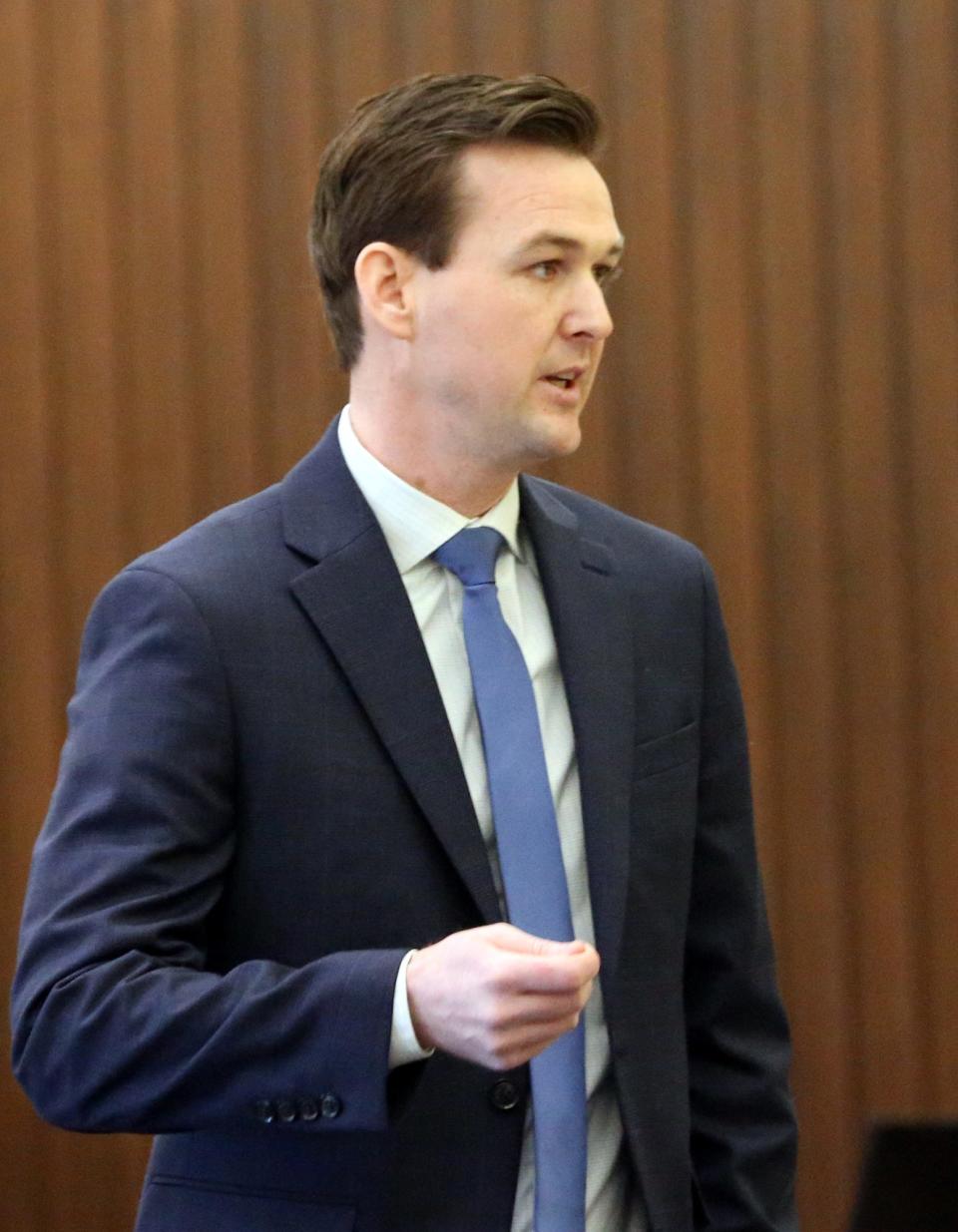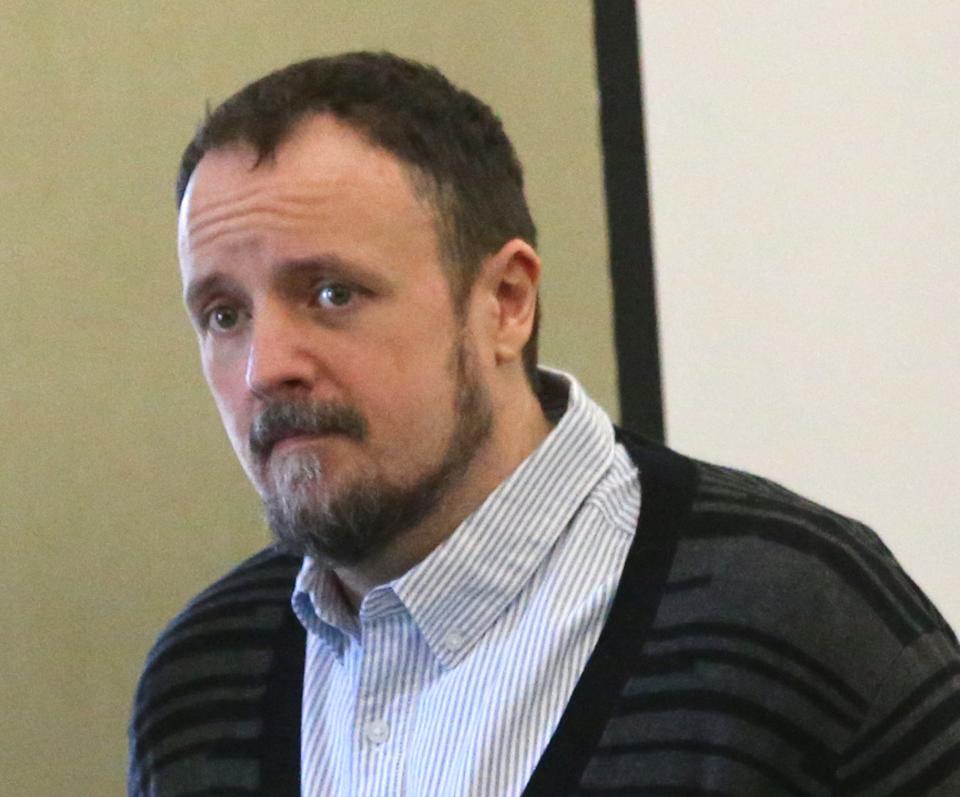Timothy Verrill on trial for grisly murders of 2 women again: Opening arguments clash
DOVER — Prosecutors argued Timothy Verrill was the only person who could have killed Christine Sullivan and Jenna Pellegrini in Farmington seven years ago, making their case Tuesday in the opening of Verrill's second trial.
The women were killed at the 979 Meaderboro Road home of Dean Smoronk, with whom Sullivan had a relationship, prosecutors said.
The defense, in contrast, attempted to cast doubt on the investigations done at the time, portraying Verrill as the convenient person for the prosecution to blame for the killings, suggesting there were more people who could have, and probably did, commit the heinous crimes.

Attorneys for both sides presented their opening statements Tuesday and began questioning witnesses.
Verrill, 41, sat quietly as the proceeding began.
Verrill's first trial on the murder charges ended in a mistrial in October 2019 because New Hampshire State Police failed to provide all the evidence to the defense.
Verrill is charged with killing Sullivan, who was 48, and Pellegrini, 32, on Jan. 27, 2017. Prosecutors previously said Verrill believed the women had been informing authorities about drug trafficking by Verrill, Sullivan and Sullivan’s boyfriend, Smoronk.
Smoronk has been found guilty and sentenced in multiple cases involving drugs and firearms in New Hampshire and out of state.
Evidence police failed to provide in the first trial, which led to a mistrial being declared, included five witness interview recordings and various emails and text messages investigators exchanged with witnesses. As a result, the discovery evidence was not provided to the defense until late in the first trial.
Prosecutors say women were stabbed dozens of times

In his opening statement, Assistant Attorney General Brian Greklek-McKeon portrayed Verrill as a “paranoid drug dealer.” He said on Jan. 27, 2017, Verrill stabbed Sullivan eight times, and used blunt force trauma that was so severe, it fractured her skull and caused bleeding in her brain. He said she was alive for at least part of the attack and fought back, sustaining many defensive wounds. He said Verrill stabbed Pellegrini 43 times in the neck, chest and back and also used blunt force trauma and she was likely sleeping when the attack began so she did not fight back.
Greklek-McKeon said Verrill took disorganized steps to try and hide the crimes, discarding their bodies beneath the porch, and making efforts to clean the blood and remove other evidence on trash bags. The bags later were found with Verrill’s prints on them, he said.
Verrill faces felony counts of first-degree murder, and second-degree murder as an alternative theory for both women. He is also charged with falsifying physical evidence for his alleged efforts to hide the bodies and other evidence.
Greklek-McKeon showed mass transit video he said proves Smoronk was in Florida at the time of the killings and could not have killed the women. The state provided text messages from Florida when Smoronk was trying angrily to reach Sullivan and Tuesday's first witness, Vanessa Mango.
Mango testified Smoronk was with her and she was his girlfriend in that state.

Video presented by the state showed Verrill, Sullivan and Pellegrini at the Meadorboro Road residence on Jan. 27. At one point, Verrill appeared to enter a detached garage and spray painted the windows green. Cans of spray paint with his fingerprints on it were found, prosecutors said.
The prosecution stated Verrill was staying with Joshua Colwell, another associate in Farmington. Earlier testimony transcripts indicated Colwell said Verrill was at his place, acting erratically, asking if he thought Pellegrini was an informant. He said Verrill said he was going to go back to Smoronk's house and set up his own cameras.
The state alleges Verrill, after the murders, tried to clean up. Greklek-McKeon said he wrapped the women's bodies in bedding, cloths and tarps, then put them under the porch, piling junk on top of them "as if they were trash."
Greklek-McKeon said Verrill returned to Colwell's house, grabbed a beer and went inside, saying it was an interesting night.
''He asked for a pair of pants and started drinking shots," said Greklek-McKeon. "He told Josh he had to tie up a few loose ends. He went to Walmart and bought a phone, at Lowe's he bought salt melt and ammonia cleaners."
Greklek-McKeon said Verrill returned to Smoronk's house to clean up, using the ice melt to try and eradicate a blood stain on the ice on the porch, where he said Sullivan was likely killed.
Greklek-McKeon said when Smoronk could not reach Sullivan, he made arrangements to return from Florida, and also authorized friends to break into his home to look for the women. In Pellegrini's room, the friends found a blood-stained mattress, prosecutors said.
At that time, Greklek-McKeon said, Verrill called his mother and asked to go to rehab. She took him to Wentworth-Douglass Hospital in Dover.
Smoronk arrived home Jan. 28 about 1:30 a.m. He turned on his surveillance systems, which had been turned off and looked at Jan 27, finding there was 1 day, 17 hours and 18 minutes missing, prosecutors said. He called police two hours later.
"There is no boogeyman; there is only Verrill," said Greklek-McKeon, echoing what was said in Verrill's first trial in 2019.
Defense argues prosecution's case is 'unreliable'

In his opening statement, public defender Matthew McNicoll said "Christine and Jenna fought back, very hard. Tim had no reason to kill, no motive, yet the state will ask you to convict a man of a murder he did not commit."
McNicoll said the defense planned to ask questions the state will not be able to answer.
"The state's inability starts with the investigation," he said, referring to the discovery issue that resulted in the new trial. "The state will tell you it's all true, what’s done is done, but there is no transforming an unreliable investigation into a reliable one."
McNicoll said the state collected evidence and ignored leads that should have been looked at more closely.
"Based on that they made choices and decisions about this case they shouldn’t have," he said. "This case starts with drugs. This is a universe of people buying and selling drugs, and about growing their drug enterprise. Tim sold drugs, used them. He was growing detached from the world. Dean and Christine met in Florida and she came to help the drug operations here. Dean had a home in Florida, too, Christine had a business selling secondhand items she refurbished."
McNicoll said Smoronk wanted Christine out of his life. He said Colwell was a high-ranking member of a motorcycle gang who owed money to Smoronk and acted as an enforcer, helping to collect debts owed to Smoronk.
McNicoll said the investigation "tunnel visioned" on Verrill, ignoring other avenues.
"Think critically about what you see and don’t see," he urged the jury. "Look at evidence like DNA and fingerprints. They are his, but how did they get there?

McNicoll said both women were alive and happy when Verrill was there and when he left.
"He had no motive to kill them," he said. "Speculation said he was unwell. Consider the other players and their suspicious behavior, their associations. The state needs to prove who killed, but they are pointing at the wrong man. Tim did not kill them, and he is not guilty."
Tracey Flaherty, intelligence analyst for New Hampshire State Police's Major Crimes Unit, testified phone records supported the state's contention Smoronk made many attempts to reach Sullivan on the night of the murder.
Brentwood Officer Evon Cary, who was a Farmington police officer at the time of the 2017 murders, testified being called by Smoronk to report his girlfriend was missing and described a bloody scene at the home.
This article originally appeared on Fosters Daily Democrat: Timothy Verrill on trial for grisly murder of 2 women in Farmington
